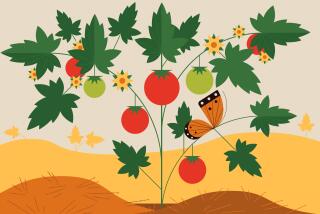Garden Jobs
- Share via
Things to do this week:
* Not too late. Even though some bulbs have already sprouted in the bins at nurseries, it’s not too late to plant them, as long as they aren’t moldy. At least now you know which way is up, since the sprouts grow from the top! When you dig the planting hole, pulverize the soil before refilling it so clumps of soil do not break the sprouts.
Check out several exciting new bulbs that will come back year after year with no digging, dividing or much care at all. Foot-tall sparaxis and tritonia--originally from the summer-dry areas of South Africa’s Cape--are now available in separate colors, instead of the usual wild mix. Bermuda Sands, for instance, is a lovely soft pink tritonia. Purple Majesty is a deep purple sparaxis.
* A safe spray. As soon as deciduous fruit trees lose their leaves, spray with a dormant oil solution (available at nurseries). Oil sprays are not poisons but suffocate scale insects, aphids, mites and other pests.
You say there are no bugs on your leafless trees? Insects don’t just disappear for the winter. A few are hiding in the bark and fissures of otherwise naked trees, ready to spread and multiply come spring. When you use a dormant oil spray, make sure you drench the tree (and follow other label directions). It’s also a good idea to spray with a lime-sulfur or copper spray, safe fungicides for leafless trees (though don’t use sulfur on apricots). They knock down overwintering fungus and virus diseases.
The University of California Common Ground program suggests spraying three times in winter--around Thanksgiving, on New Year’s and on Valentine’s Day or thereabouts, just before buds swell.
* Now that it has started to rain:
--Prepare areas where you want to plant so you won’t have to when it’s wet.
--Apply a mulch (such as shredded bark or compost) in beds so it will cushion the impact of rain drops.
--Be sure to mulch paths or place steppingstones where you will need to walk (by vegetable beds, for instance) so you don’t have to step on wet soil.
--Make sure rain gutters are clear or they’ll overflow and erode soil.
--If you use watering basins when watering trees and shrubs in summer, flatten them now so rains will not stand near the base of the plants, which can cause diseases.






